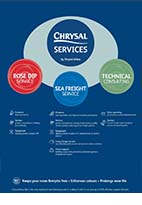Featured Past Articles
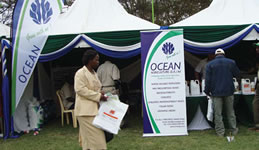 The CFC Stanbic Bank Naivasha Horticultural Fair will be 13 years old this year. Starting from humble beginnings in 2002, the Naivasha Horticultural Fair has grown to be one of the biggest Horticultural Shows in Africa. From an initially purely horticultural perspective the NHFAIR is branching out into the whole agricultural sector. Every year the number of stands and the number of visitors increases, from 60 stands in 2002 to over 200 stands in 2015.
The CFC Stanbic Bank Naivasha Horticultural Fair will be 13 years old this year. Starting from humble beginnings in 2002, the Naivasha Horticultural Fair has grown to be one of the biggest Horticultural Shows in Africa. From an initially purely horticultural perspective the NHFAIR is branching out into the whole agricultural sector. Every year the number of stands and the number of visitors increases, from 60 stands in 2002 to over 200 stands in 2015.
The relaxed atmosphere and spacious venue attracts the crème de la crème of the agricultural sector. Many exhibitors take the opportunity to launch new products and innovations at the NHFAIR, so as a visitor you have a one-stop venue that gets you in contact with all your suppliers, and you are also kept informed on all the new market trends – very important in a fast evolving business. Decision makers from both sides of the industry attend, and a lot of business is concluded. There is ample parking, loads of space, a great food hall and a children’s entertainment area. So not only can visitors catch up on business, they can combine it with a family day out. The NHFAIR is run by a small organising committee that operates on an entirely voluntary basis. The Exhibitors and visitors are proud to know that 100% of their donations go to good causes. Every year more and more funds are raised for charity and are dispersed through the NHFAIR Trust. The NHFAIR partners with other donors in order to increase the effective value of donations and to raise the
Read more: CFC Stanbic Bank Naivasha Horticultural Fair 2015 Building Better Lives!
There is a chance that even as you read this third rate column I’m facing a commission of enquiry investigating my character for the last six months. The commission most likely to be chaired by my father in-law with his first born, as the lead counsel will have the mandate to probe, investigate and recommend to the whole chain of Eve’s descendants if I’m a man enough to take care of their daughter.
As I fix these words to make some sense, the hosts of divorcees are knocking my door. This has nothing to do with being incapacitated to perform my duties as a husband but it is purely malice from the enemies of my family developments. But it can all be blamed on IFTEX, the self-proclaimed international exhibition. It all started when they requested the first lady to open the 4th show in Kenya.
She caused all this because I had informed Officerless, the Eve’s descendant I swore in front of a mammoth crowd that I will never look left, right or backward when am walking with her till death does us apart that all roses grown in Kenya are for export. I had convinced her that the only time Kenyans are allowed to buy roses is during valentine and funerals.
By Oscar Shilliebo
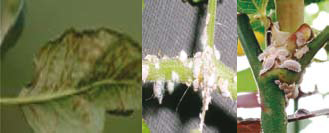 Mealybugs in Kenya were original pests that attacked the coffee plants in the eighties but as the flower and rose growing industry begun to thrive, the pests found a new host and were transferred through to roses from the coffee bushes through coffee stakes that were used to hold the rose beds together and as well through grafted roses.
Mealybugs in Kenya were original pests that attacked the coffee plants in the eighties but as the flower and rose growing industry begun to thrive, the pests found a new host and were transferred through to roses from the coffee bushes through coffee stakes that were used to hold the rose beds together and as well through grafted roses.
Before the onset of IPM and use of biological methods to manage especially the red spider mites in roses, Mealybugs were not a major pest in rose growing. The reason being that most Miticides used to manage the spider mites were also controlling the mealy bugs and other pests on the rose crop. But as the pest management practices shifted more towards IPM and biological control especially for the spider mites which use to account for more than 40% of the total chemical cost the attentions then shifted and other pests begun to be of importance. One such pest is the Mealy bug.
K enya’s pepper exports to the European Union (EU) risk a ban following the emergence of a new and lethal pest that has wrecked havoc on the crop in different parts of the country.
Farmers in pepper growing areas of central Kenya, Naivasha, Athi River, Kitengela and Isinya have been placed on high alert following the outbreak of the pest called False Codling Moth (FCM).
Scientists said no pesticide has been identified to deal with the new threat which has already seen capsicum produce from Uganda banned from the EU market.
By S.K. Bandyoa Padhay- ( Mr. Barnejee )
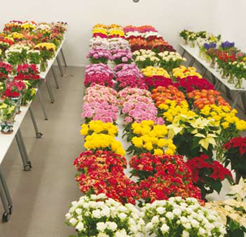 Flower production costs in Kenya have increased significantly due to outbreak of disease like downy mildew, powdery mildew and botrytis and since this has become a limiting factor for production, it has become a concern for the investor.
Flower production costs in Kenya have increased significantly due to outbreak of disease like downy mildew, powdery mildew and botrytis and since this has become a limiting factor for production, it has become a concern for the investor.
Most growers use high amount of chemicals to control the disease, unaware of the fact that a timely and balanced mineral nutrition can prevent the disease as this enables the plants to develop the resistance against the disease, but in reality most growers resort to use of high level of chemicals which not only raises concern on environment and safety but also leaves economical consequences as well.
Essential plant nutrients in proper combination, concentration and ratio depending on the media type and climatic condition make the plants healthy and tolerant or resistant to disease where as the deficiency of them make the plants susceptible to diseases.
Read more: How balanced mineral nutrition can prevent disease infestation for rose plants
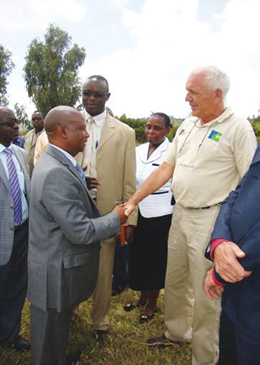 Helping reconstruct a street boy emerging from the tough life in the Kenyan streets is not about the talk, it’s about the walk. It’s not about the what, it’s about the how. And it’s never about the will, it’s about the will. But how can you get it right if you are on the wrong part of the world? Naivasha Horticultural Fair is doing it again this year. Their generous contribution in many areas has helped enormously. They have involved themselves in plentiful charitable projects which are of great help to the community at large.
Helping reconstruct a street boy emerging from the tough life in the Kenyan streets is not about the talk, it’s about the walk. It’s not about the what, it’s about the how. And it’s never about the will, it’s about the will. But how can you get it right if you are on the wrong part of the world? Naivasha Horticultural Fair is doing it again this year. Their generous contribution in many areas has helped enormously. They have involved themselves in plentiful charitable projects which are of great help to the community at large.
One of the greatest secrets of the rich and mighty is giving to the needy part of what they profit. This not only goes in tandem with the saying that “For every action, there must be some reaction” but also unleashes some power that the smartest of all investors in the world has never been able to explain. This could not necessarily be a reason the hortifair but the greater need for the horticultural growers and exporters to look at the problems of the local people with a human eye.
The corporate involvement in development in this regard has been left a-new concept based on the traditional belief that it is only the government that is mandated with the responsibility of initiating development. NH Fair has in this regard created a great possibility in a short time since it takes the government quite a while to study the feasibility of any needed project before approving and hence implementing it.
John Giles, a market research consultant and the divisional director at Promar International, a leading UK-based agri food supply chain consulting firm, gives a sneak peek about emerging future sources of supply for UK buyers
Your presentation at LPS15 focus on a market analysis of increasingly important potential sources of supply. It include Ethiopia among others. Why Ethiopia in particular?
John Giles (JG): The idea is to present something different. We all know probably quite a bit about the likes of Chile, Turkey, South Africa, Kenya and Egypt as suppliers. I want to move away from the familiar suspects and look at lesser-known countries around the world as an educational guide.
Ethiopia, is deliberately-chosen country of which people will have some sense, but probably won’t know a great deal, yet it is becoming more influential and important. It can produce a wide range of produce – a combination of fruits and vegetables – it is known for some products and some participation in international markets.


